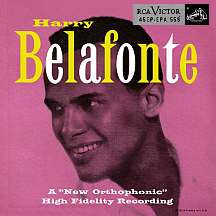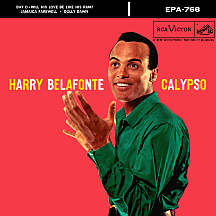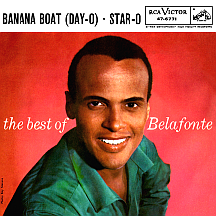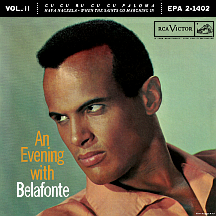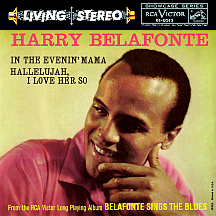HARRY BELAFONTE
Another beautiful day. You brew a cup of coffee and step out onto the veranda as the sun is rising, overlooking a vast landscape of trees or hills or desert or a cityscape (depending on where you live). Suddenly, out in the distance, a voice, from where you are not entirely certain, cuts through the still-chill-but-warming morning air, its familiar timbre enhancing the relative quietness: "Day-O!" You've heard it many times before, an inexorable cry, one of nature's myriad sounds, echoing, comforting; it soothes the nerves. "Da-a-ay-O!!!"...and for that brief moment, you know our earth is still alive, vibrant and a-okay...
The sound, a pop culture mainstay, originates from the vocal cords of Harold George Belafonte, often referred to by one name, be it Belafonte or just Harry. Born in New York City in 1927 of Caribbean heritage, his parents (West Indian dad, Jamaican mom) split up when he was young. He spent part of his time in N.Y. with his mother and the rest with relatives in Jamaica, poverty-stricken in both situations. He didn't finish high school, opting instead to join the U.S. Navy during the final stretch of World War II. On returning to New York, he set about becoming an actor and singer, taking a job as a stagehand at the American Negro Theater, a group that began its operation in the basement of the New York Public Library, renovated for the purpose of presenting stage plays with African-American actors in that precise location. Belafonte was one of a number of notable stars including Ruby Dee and Sidney Poitier who performed there in the 1940s and studied in the company's Drama Workshop .
His interest in singing landed him at Broadway nightclub the Royal Roost in the late '40s, alongside next-level musicians like saxophonist Charlie Parker and trumpeter Miles Davis. In 1949, with the Royal Roost's lineup of talent packing the place nightly, Belafonte recorded two sides with be-bop trumpeter Howard McGhee's orchestra for Roost Records (a label started by the club's owner, Ralph Watkins). "Lean on Me" is a pop offering with a standard arrangement; its B side, "Recognition," was penned by Harry with socially-conscious lyrics ('I search this land for happiness...before my days are done, will my burden be less?') and performed with a vocal flair that hinted at the approach he would use in the coming years.
Harry preferred singing the folk songs of his family's heritage and wished to write originals in the same vein. He established The Belafonte Singers, a choral group with everchanging members from different ethnic backgrounds that performed with him and released product separately. "Simple Simple" was the first of two 78s on the Jubilee label in '49 and '50; the second, a longing love song set in "Venezuela," became a popular part of his regular repertoire. He recorded a handful of songs for Capitol Records in different styles, not all of which were released. "Sometimes I Feel Like a Motherless Child," a gospel song from the mid-19th century, had been recorded in the mid-1920s by Paul Robeson, a favorite singer of Harry's while growing up. "I Still Get a Thrill (Thinking of You)," a romantic song with a pop arrangement penned by Harlem-based songwriters J. Fred Coots and Benny Davis, represented the other side of the musical spectrum. Harry left Capitol in 1950.
While between record labels in the early '50s, he appeared at a number of Manhattan nightclubs, primarily singing tradional folk songs that went over well with the Greenwich Village crowd. Signing with RCA Victor in 1952, he began developing a following with record buyers outside the Tri-State area. His version of "Man Smart (Woman Smarter)," first performed in the mid-'30s by Trinidadian singer King Radio (real name: Norman Span), one of the more popular calypso acts of the 20th century, placed Belafonte squarely at the forefront of a calypso revival, a position he reveled in, as these were the folk songs he grew up with while living in Jamaica. "Scarlet Ribbons (For Her Hair)" (an original by New York-based songwriters Jack Siegel and Evelyn Danzig) and "Gomen Nasai (Forgive Me)" (penned by Japanese composer-conductor Raymond Hattori with lyrics in English by Dr. Benedict Mayers) were his first singles to appear on national juke box charts and sales surveys. "Matilda, Matilda!," another traditional calypso tune (...she take me money and run Venezuela!') further illustrated Harry's penchant for island chants.
John Murray Anderson's Almanac was a stage musical that ran on Broadway from December 1953 through June '54. With a large selection of songs, many composed by N.Y. theater regulars Richard Adler and Jerry Ross, the show had a diverse cast (including Hermione Gingold, Polly Bergen, Orson Bean, Billy DeWolfe and Tina Louise) and its Mark Twain segment with Belafonte was a critical favorite; he won a Tony Award and a World Theatre Award for his performance. Another song from the show, "Hold 'em Joe" ('...the donkey want water...'), was issued on an RCA single. In 1954 his first album release, "Mark Twain" and Other Folk Favorites (featuring guitarist Millard Thomas, who frequently worked with Harry, and Hugo Winterhalter's orchestra and chorus), eventually made the top ten on Billboard's album charts.
That same year, Belafonte made his first film appearance in Bright Road, a schoolroom drama starring Dorothy Dandridge (she played a teacher, he was the school's principal). Afterwards, they starred together in director Otto Preminger's big-budget musical based on Richard Rodgers' successful 1943 Broadway show Carmen Jones (an adaptation of the 1875 opera Carmen by French composer Georges Bizet). His role was a non-musical one while Dandridge sang and danced in several numbers; she was nominated for an Academy Award for Best Actress for her performance (the third black actress to be nominated for an Oscar, following Hattie McDaniel in 1939 and Ethel Waters in 1949). This film in particular raised Belafonte's profile, which didn't hurt when it came to selling records. His second album came out in late '55; Belafonte included new versions of earlier singles "Matilda, Matilda!" and "Scarlet Ribbons" in addition to another popular song, "Jump Down, Spin Around" ('...pick a bale o'cotton'). The LP spent six weeks at number one on the album charts in March and April of 1956.
The Calypso album was released with new material and a few re-recordings of earlier singles. Representations of the Caribbean working class were mixed with wistful love songs and island singalongs. Lord Burgess (born Irving Louis Burgie in Brooklyn of U.S. and Barbados parentage), a Juilliard-trained musician just a few years older than Harry, contributed several compositions to the album including lead single "Jamaica Farewell," a bittersweet love song about a sailor with ties to Jamaica: '...my heart is down, my head is turning around, I had to leave a little girl in Kingston town.' This was Belafonte's breakthrough, peaking in the top 20 during a half-year chart journey, helping spark widespread interest in the album; in September, Calypso became the number one seller in America.
A non-LP recording joined "Jamaica Farewell" in the top 20 in December 1956: "Mary's Boy Child," penned by Jester Hairston (another Juilliard alumnus), praising the birth of Christ ('Hark, now hear the angels sing, a king was born today...'), ranked as one of the more serious carols of the holiday season. The following year, an unedited version (about a minute and a half longer) appeared on the album An Evening with Belafonte; in the U.K., a single release spent seven weeks in the number one position from November '57 to January '58, several months after he'd upped the ante on both sides of the Atlantic Ocean with a relatable song about the nightly grind certain workers endured at the edge of the Caribbean Sea where it connects to that vast body of water.
A job at the loading docks in Trinidad's various harbors along the northern tip of South America can have its down side. Start work in the dark, continue through the night, stack eight-foot bunches and keep an eye out for deadly tarantulas. Thankfully, 'Day-O' is a celebratory outburst as opposed the sound a man makes after getting a spider bite. Sun come up, man go home, start again at sundown. Harry articulated this routine (better than I just did), dedicating the song to the many workers of his ancestry. "Banana Boat (Day-O)" became his signature hit and the main force driving sales of Calypso. The single was a top ten smash in February and March '57 (gaining the edge in a tightly-contested competition with one of many covers, The Tarriers' "Banana Boat Song"), holding the number five spot for five straight weeks while adored teen-appeal stars Elvis Presley, Tab Hunter, Pat Boone and Tommy Sands formed a blockade at the chart's apex. With a slightly more mature fan base, Belafonte foiled them all on the album side with 31 weeks at number one over a 38-week span from September through May. Even Elvis couldn't hold the top spot that long.
Steve Allen presented a gold record to Harry for Calypso on his Sunday night NBC-TV variety show, stating he was "the first performer to sell over a million copies of a single album." The hits kept piling up in 1957 with more Belafonte-Burgess calypso tunes; "Mama Look at Boo Boo" (sung 'a-boo-boo') asked the question 'I wonder why nobody don't like me...or is it the fact that I'm ugly?' The title ballad from his third film (and third with Dandridge), "Island in the Sun," was on a two-sided top 40 single paired with a Jamaican slice-of-life, "Cocoanut Woman." For several weeks he had three simultaneous top 20 hits and for a couple of weeks in March there were four different singles on Billboard's Top 100. He milked the concept for another strong-selling album that year: Belafonte Sings of the Caribbean. The 1958 LP Belafonte Sings the Blues brought him his first Grammy nomination (for Best Rhythm and Blues Performance) in the first year of the award's existence.
There were two more major motion pictures in 1959: sci-fi film The World, the Flesh and the Devil depicted a nuclear holocaust scenario with only three survivors: Harry, love interest Inger Stevens and bad guy Mel Ferrer. Odds Against Tomorrow, a Robert Wise-directed bank heist drama with Robert Ryan and Shelley Winters, was the last movie he acted in for more than a decade. On December 10, 1959, he hosted a TV special, Tonight with Belafonte, an all-music presentation that was part of The Revlon Revue; folk singer Odetta and bluesmen Sonny Terry and Brownie McGhee were guests. He won an Emmy for the show in the Variety, Musical Program or Series category. After three Grammy noms (Album of the Year, Vocal Performance, Male, and Folk Performance) for the live concert album Belafonte at Carnegie Hall in 1959 and two more the following year for Belafonte Returns to Carnegie Hall (in the first two categories), he scored his first win for "Swing Dat Hammer," also in '60; the Belafonte Singers received their own Grammy that year for The Belafonte Folk Singers at Home and Abroad in the category Best Folk Recording.
In 1965 he teamed with singer Miriam Makeba, who'd left her home in South Africa due to Apartheid and was unable to return for 30 years. She made the most of living in the U.S., recording for RCA Victor to positive reviews and winning a Best Folk Recording Grammy with Harry for the album An Evening with Belafonte/Makeba. Harry's track record with the Grammy Awards totaled eleven nominations and three wins. The Easy Listening radio stations of the late '60s embraced his newer efforts; his style was considerably different (nearly unrecognizable) on the whistling-tune hit from 1967, "A Strange Song." He also reached the easy top 40 with a cover of Jimmy Webb's "By the Time I Get to Phoenix." 1970s highlights include an Emmy-nominated TV special, Harry & Lena, with the fabulous Lena Horne, and roles in studio films The Angel Levine from '70 (costarring with Zero Mostel) and two (1972's Buck and the Preacher and Uptown Saturday Night from '74) with longtime friend Sidney Poitier.
Over the last half-century, Harry Belafonte has been active in many Civil Rights issues, spearheading funding for a number of serious charitable projects in Africa and as a UNICEF goodwill ambassador. Meanwhile, his ultra-familiar "Day-O" call continues to echo across the landscape...and everyone seems to love it. I sometimes wonder, in the event he was a sports fan, how he felt about hearing his own voice so often during baseball games. Musically, socially, politically...his is one of the great voices of our times.
NOTABLE SINGLES:
- Lean on Me /
Recognition - 1949 - Simple Simple - 1949
- Venezuela - 1950
with the Belafonte Singers - Sometimes I Feel Like a Motherless Child - 1950
- I Still Get a Thrill (Thinking of You) - 1950
- Chiminey Smoke - 1952
- Man Smart (Woman Smarter) - 1952
- Scarlet Ribbons (For Her Hair) - 1952
- Gomen Nasai (Forgive Me) - 1953
- Matilda, Matilda! - 1953
- Hold 'em Joe /
I'm Just a Country Boy - 1954 - John Henry - 1956
- Jump Down, Spin Around - 1956
with the Norman Luboff Choir - Jamaica Farewell - 1956
- Mary's Boy Child - 1956
- Banana Boat (Day-O) /
Star-O - 1957 - Mama Look at Boo Boo /
Don't Ever Love Me - 1957 - Cocoanut Woman /
Island in the Sun - 1957 - The Waiting Game /
Ain't That Love - 1958 - Little Bernadette - 1958
- The Son of Mary - 1958
- Oh Freedom - 1960
with the Belafonte Singers - There's a Hole in My Bucket - 1961
by Harry Belafonte and Odetta - Lullaby - 1965
by Belafonte / Makeba - A Strange Song - 1967
- By the Time I Get to Phoenix - 1968


